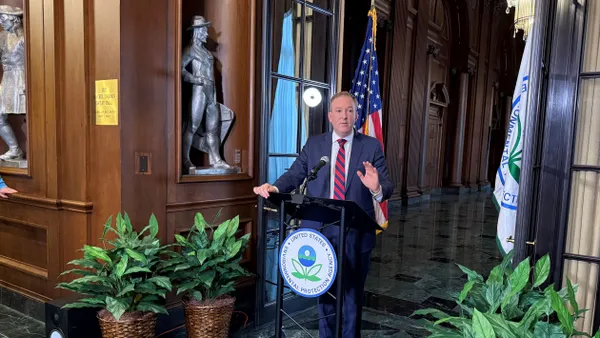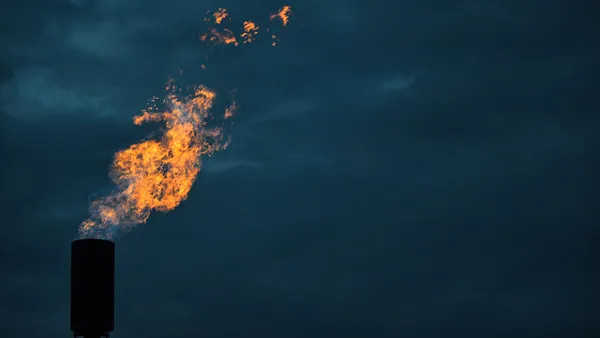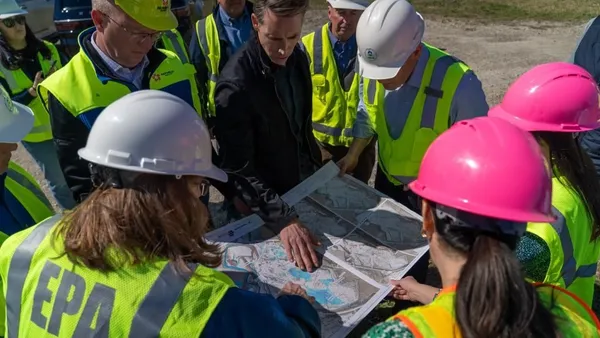Dive Brief:
- The U.S. EPA says Waste Connections’ Chiquita Canyon Landfill has violated the Clean Air Act and its Title V operating permit by failing to properly inspect or repair gas collection systems, thus emitting excessive toxic gasses. The agency issued a violation on June 4.
- The violation is the latest in a series of ongoing regulatory actions against the site in Castaic, California, related to odor complaints that date back years. Waste Connections says it has “been actively engaged in a focused and intensive effort” to mitigate such issues.
- Chiquita Canyon also continues to face thousands of odor complaints from residents, a lawsuit from residents who want to close the landfill and numerous notices of violations from other state and local regulators.
Dive Insight:
Chiquita Canyon is one of the region’s biggest landfills, and it has been a source of ongoing regulatory issues for Waste Connections. Last fall, the company was ordered to mitigate worsening odor issues at the landfill through an agreement with the South Coast Air Quality Management District, the local air quality board. The 639-acre landfill has been the subject of thousands of odor complaints from residents who say they have experienced health issues such as asthma attacks, bloody noses and nausea.
The EPA estimates odor issues worsened at the landfill around May 2022, but complaints rapidly increased around April 2023. Waste Connections says the source of odors likely comes from an “elevated temperature event” that has caused increased landfill gas and liquid production in an older, inactive part of the landfill.
Waste Connections says it’s working on numerous projects to address the issue, including conducting more detailed odor surveillance and expanding and improving its gas well system. Waste Connections is also required to maintain an odor mitigation website with regular updates on the effort.
The EPA now says Chiquita Canyon has failed to adequately implement such mitigation and monitoring measures, noting in the June 4 violation that it inspected certain gas collection wellheads less often than required, “failed to adequately operate” the landfill’s active collection system at gas collection wells and “failed to operate air pollution and control equipment in a manner consistent with good air pollution control practices.” Some wellheads experienced downtime of over 120 days, it said. The agency says some of violations took place at “various periods” between 2022 and 2023, while others took place in 2023 through the present.
The EPA specifically cited violations under the National Emission Standards for Hazardous Air Pollutants and New Source Performance Standards.
The EPA also alleges Waste Connections failed to adequately monitor and correct landfill gas temperatures “inside and outside the reaction area.” Such violations can cause excess emissions of hazardous air pollutants, the EPA said. The violations could result in fines or further legal action, according to the agency.
Waste Connections did not respond to a request for comment as of press time, but said in a statement on its monitoring website that it was “actively evaluating the findings from the EPA” and “working cooperatively with them and our regulators to address any outstanding issues.”
Waste Connections continues to post weekly updates on its mitigation strategies, including reports on methane data, well drilling, cover issues, leachate seep inspections and temperature monitoring. Last week, Waste Connections also submitted an updated air monitoring plan to the EPA as part of an earlier administrative order from February, in which the EPA ordered Chiquita Canyon to take steps to mitigate odors emanating from the landfill.
Local enforcement agencies also inspect the facility monthly because Chiquita Canyon is on CalRecycle’s inventory of solid waste facilities the agency says violate minimum state standards.
Meanwhile, Chiquita Canyon is also facing a lawsuit from Citizens for Chiquita Canyon Closure, a group of residents that are suing L.A. County and Chiquita Canyon Landfill to try to close the facility.
At a June 4 hearing in L.A. County Superior Court, Judge Stephen Goorvitch said he was sympathetic to resident complaints but did not have the authority to consider their specific case, the Santa Clarita Signal reported. The group could come back with a revised complaint at a case management conference scheduled for September 25.
In a statement, Waste Connections said it was “pleased” with the judge’s decision, which allows the landfill to continue operations. “As the EPA and other regulatory agencies have concurred, the landfill’s regular waste disposal operations are not affecting or contributing to the elevated temperature landfill event (ELTF) occurring at Chiquita Canyon,” it said.
Meanwhile, Chiquita Canyon continues to receive notices of violation from several agencies including the AQMD and state Department of Toxic Substances Control.
It’s unclear how much it could cost Waste Connections to address Chiquita Canyon’s odor issues long-term. According to SEC filings from April, before the EPA violation announcement, the Chiquita Canyon operators are “not able to determine the likely penalties that the regulatory agencies will seek for these violations, but they could be substantial.” The landfill is also incurring “substantial costs” for air monitoring and leachate management.
In the third and fourth quarter of 2023, the company incurred about $30 million in costs related to Chiquita Canyon, and expects to spend about $75 million in 2024. SEC filings indicate it could spend $40 million in 2025.
According to its mitigation website, Chiquita Canyon spent $3.5 million to provide Los Angeles County with funds for “environmental, educational, and quality life programs,” with $2.5 million of that going to establish a utility relief program for residents living near the landfill. Chiquita Canyon will spend an unspecified amount on a separate Community Relief Program to pay for residents’ temporary relocation, “home hardening” projects and/or increased utility bills related to odor issues.














